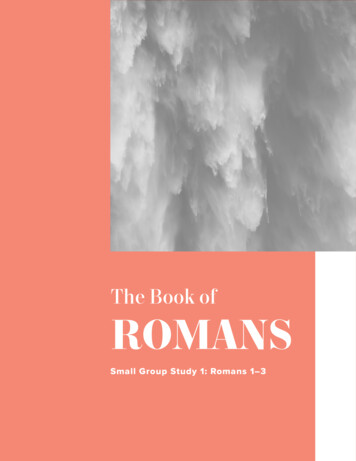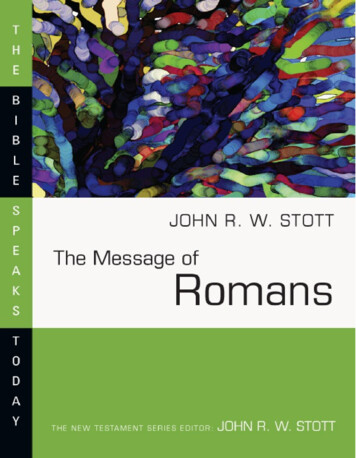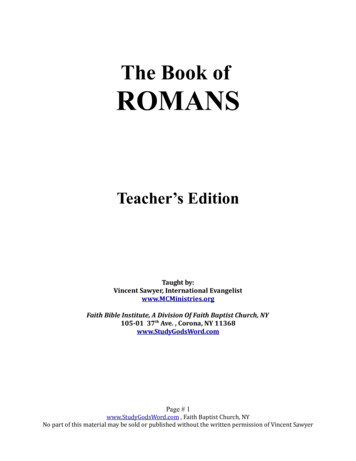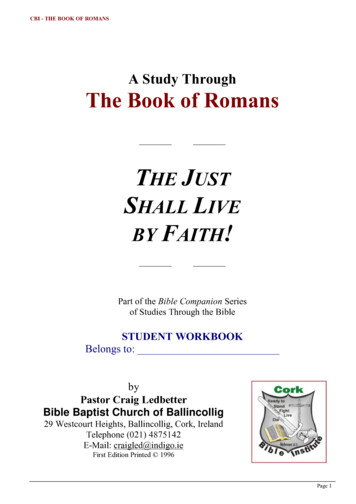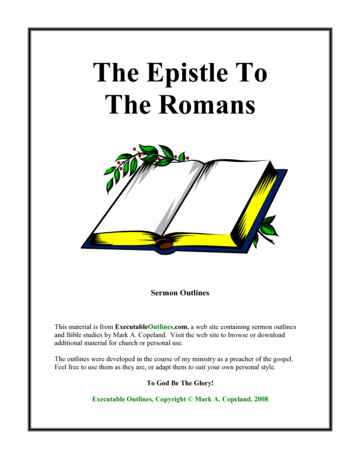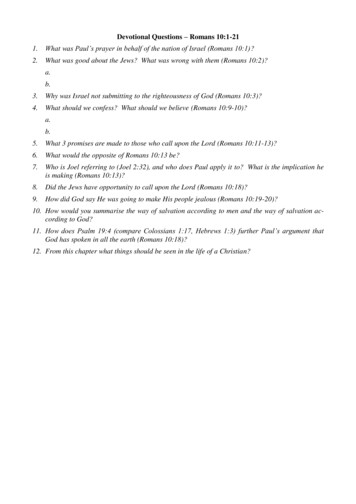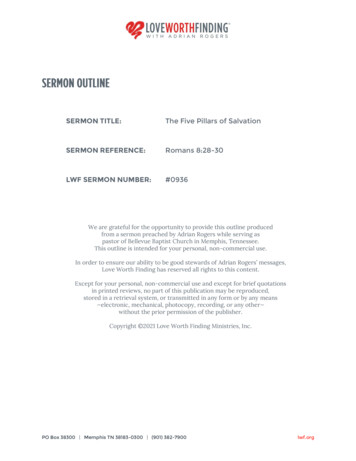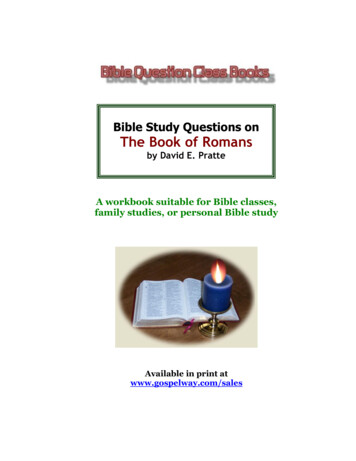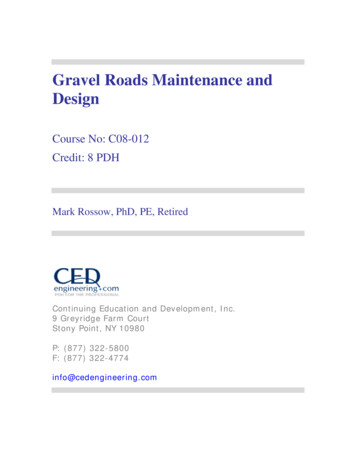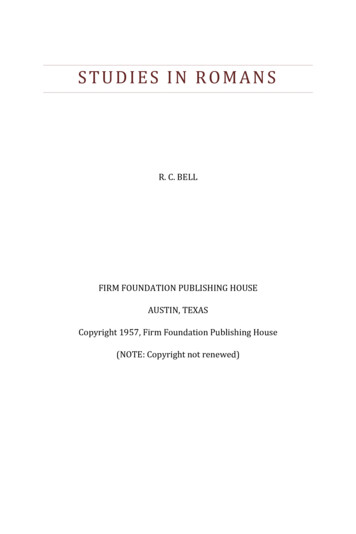
Transcription
STUDIES IN ROMANSR. C. BELLFIRM FOUNDATION PUBLISHING HOUSEAUSTIN, TEXASCopyright 1957, Firm Foundation Publishing House(NOTE: Copyright not renewed)
CHANGES IN THIS EDITIONThis 2012 electronic edition of R.C. Bell's "Studies in Romans"was scanned, converted, proofread, and edited (details below)by Bradley Cobb, and made available through:www.GravelHillchurchofChrist.comChanges in this edition are as follows:1. Any obvious spelling errors have been corrected.2. Some grammatical errors were corrected (subject/verbagreement).3. Because of the change in format, the page numbers inthis edition will not match up with the page numbers inthe original. If you reference this edition of the book,just make sure to note that it is the electronic edition.4. Some of the verse references were unclear in theoriginal ("v 9", for instance), and have been changed tomake it more obvious which verse is being referenced("10:9").Please note, any Bible reference in parentheses that does notgive a book name is a reference from Romans.Note: This book was originally copyrighted 1957, and itscopyright was never renewed. Therefore, the text of theoriginal edition has passed into the public domain.
TABLE OF CONTENTSChanges in this Edition. 2Table of Contents . 3LESSON 1. 12Commendations . 12Methods . 13General Survey of Romans . 14Questions . 15LESSON 2. 16Personal Matters (8-16). 16"A Righteousness of God" . 17Questions . 19LESSON 3. 20"The Wrath of God" . 20Responsibilityof the Heathen . 21Questions . 23LESSON 4. 24"They Became Fools". 24"God Gave Them Up" . 25Questions . 27LESSON 5. 28Humanity on Probation. 28
God's Judgment of His Steward. 29Questions . 31LESSON 6. 32Jewish Pride Punctured. 33Questions . 35LESSON 7. 36Argument for Condemnation Concluded (3:9-20). 38Questions . 39LESSON 8. 40Questions . 43LESSON 9. 44The New Testament Witnessed by the Old Testament . 45Questions . 47LESSON 10 . 48"Heir of the World" . 48The God of Resurrection . 49Questions . 51LESSON 11 . 52Christian Assurance . 53Questions . 55LESSON 12 . 56Adam . 56"Jesus Christ Our Lord" . 57
Questions . 59LESSON 13 . 60Justification and Sanctification . 60Twofold Identity with Christ. 61"Our Old Man" . 62Questions . 63LESSON 14 . 64King and Subject. 64Master and Slave . 66Questions . 67LESSON 15 . 68Law and Gospel. 68Christians Are Dead To Lam. 69Questions . 71LESSON 16 . 72Nature of Law and of Man . 72Paul's Three Men . 74Questions . 75LESSON 17 . 76Paul's Religious Evolution. 76Paul Chosen as Apostle and as Pattern . 78Questions . 79LESSON 18 . 80
Law Fulfilled in Christ (8:1-4) . 81Questions . 83LESSON 19 . 84"The Flesh" . 84"The Spirit" . 85Questions . 87LESSON 20 . 88"In the Flesh" verses "In the Spirit". 88"The Body of This Death" . 89Questions . 91LESSON 21 . 92Working of the Holy Spirit . 92Christ Dishonored . 93Questions . 95LESSON 22 . 96Mode of the Spirit's Ministry. 97Questions . 99LESSON 23 . 100God's Over-all Program . 100Suffering and Hoping Rom. 8:17-25 . 102Questions . 103LESSON 24 . 104"We Know Not." . 104
"We Know." (Rom. 8:28-30) . 106Questions . 107LESSON 25 . 108God's Unshakable Purpose (Rom. 8:29-39). 109"God Is One Jehovah" (Deut. 6:4) . 110Questions . 111LESSON 26 . 112Paul's Preliminaries (Rom. 9:1-5) . 113Questions . 115LESSON 27 . 116God's Sovereignty . 116God's Righteousness . 117Questions . 119LESSON 28 . 120The Hardening of Pharaoh . 120Human Accountability . 121Questions . 123LESSON 29 . 124The Hardening of the Jews . 125Willing and Running in Vain . 126Questions . 127LESSON 30 . 128Two Kinds of Righteousness . 128
"All Things Are Now Ready" (Christ) . 129Questions . 131LESSON 31 . 132Rejection of Israel Not Total (Rom. 11:1-10) . 133Rejection of Israel Not Final (Rom. 11:11-32). 134Questions . 135LESSON 32 . 136The Abrahamic Covenant As An Olive Tree . 136Gentile Pride . 138Questions . 139LESSON 33 . 140Paul As Prophet . 140Paul's Worshipful Doxology (11:33-36) . 142Questions . 143LESSON 34 . 144Romans 12:1, 2 . 144Romans 12:3-8. 146Questions . 147LESSON 35 . 148Romans 12:9-21 . 149Love in Action. 150Questions . 151LESSON 36 . 152
God's Two Governments. 153Origin of Civil Government . 154Questions . 155LESSON 37 . 156The Twofold Function of the State . 156The Relationship of Christians to the State. 157Questions . 159LESSON 38 . 160The Fulfillment of Law (13:8-10). 161Questions . 163LESSON 39 . 164Christ's Return to Earth . 165Putting on Christ . 166Questions . 167LESSON 40 . 168"Strong" and "Weak" Christians (Read 1 Cor. 8-10) . 168Presumptuous Meddling . 169Questions . 171LESSON 41 . 172The Sovereignty of Conscience . 172Paul and Peter (Gal. 2:11-21) . 174Questions . 175LESSON 42 . 176
Heavenly Wisdom. 176Paul Himself Lived Rom. 14. 178Questions . 179LESSON 43 . 180Twofold Truth and Unity . 181Romans 15:1-13 . 182Questions . 183LESSON 44 . 184God and His Word . 185Questions . 187LESSON 45 . 188Paul's Province (Rom. 15:22-28; 2 Cor. 10:13-18) . 189Questions . 191LESSON 46 . 192The Power and Mystery of Prayer . 193The Indispensability of Prayer . 194Questions . 195LESSON 47 . 196The Spirit and the Church . 197Paul Lived in the Power of the Spirit . 198Questions . 199LESSON 48 . 200Paul's Repentance . 200
Questions . 203LESSON 49 . 204"The Mysteries of the Kingdom" (Christ) . 204"Through Faith" . 206Questions . 207LESSON 50 . 208Eternal Life . 209Questions . 211LESSON 51 . 212Were Paul's Prayers Answered?. 212Questions . 215LESSON 52 . 216The Church and Satan . 217Peace and Doxology . 218Questions . 219
LESSON 1Though Romans was written near the close of Paul's missionaryministry, reasonably, because of its being a fuller and moresystematic discussion of the fundamentals of Christianity than theother Epistles of the New Testament, it is placed before them. Paul'searliest writings, the Thessalonian letters, written some five yearsbefore Romans, reasonably, because they feature Christ's secondcoming and the end of the age, are placed, save the Pastoral Epistlesand Philemon, last of his fourteen Epistles. If Mordecai, withoutexplicit evidence, believed it was like God to have Esther on thethrone at a most crucial time (Esther 4:14), why should it be "judgedincredible" that God had something to do with this arrangement ofhis Bible?The theme of the Bible from Eden onward is the redemption of fallenman. Romans begins at man's end of this long, difficult way up fromdarkness to light, and portrays him as "having no hope and withoutGod in the world." Ephesians begins at God's end, and declares thatin past eternity before the foundation of the world, God purposedand planned to descend to earth as man that he might redeem manfrom ruin. Both of these ends are found in both books, but each booktreats one of them with special emphasis. In both books, God andman starting, so to speak, from their opposite ends meet in Christ,the God-man.CommendationsBiblical scholars have heaped many tributes on Romans. MartinLuther wrote: "This Epistle is of the New Testament, the purestgospel. The more time one spends on it, the more precious itbecomes." Luther's English contemporary, William Tyndale, ninetyper cent of whose translation of the Bible was incorporated nearly acentury later into our King James Version, said: "No man verily canread it too much, or study it too well. The more it is chewed thepleasanter it is,. so great treasure of spiritual things lieth hidtherein." Coleridge, poet, philosopher, theologian, regarded it "theprofoundest book in existence." Codet called it "The greatest
masterpiece ever conceived and realized by the human mind." DavidBacon wrote: "The faith of Christendom in its best periods has beenmore indebted to this Epistle than to any other portion of the LivingOracles." F. W. Farrar: "It is unquestionably the clearest and fulleststatement of the doctrines of sin and deliverance from it, as held bythe greatest of the apostles." These encomiums are cited to showwhat learned, pious men have thought of Romans, and perchancethereby to whet our appetites for its study. Undoubtedly, the roots ofthe Protestant Reformation grew up out of the deep, rich soil ofRomans and Galatians.If gifted, godly men over the centuries have found matter andinspiration for deep, prolonged study of Romans, the book mustmerit, require, and reward such study. It is not a book to be onlytasted, or hastily swallowed: it is a book to be "chewed anddigested." It cannot be read as mere pastime; it is not designed to bea substitute for a game of canasta, or an after-dinner cigar. Romans ismeant for serious, eager, earnest students of the deepest and thehighest things in life—things "that do often lie too deep for tears."MethodsAbout fifty-five years ago, I was a member of a small class in the oldNashville Bible School, studying Romans under James A. Harding. Asour final examination, we were seated in a row on the stage of thelittle chapel one night to repeat from memory, each student a verseat a time, round and round the class (In such manner classes recitedthe multiplication table in those days as some of my readers recall,"If they be willing to testify"), the entire book before a room full oflisteners. I memorized the words of Romans in that class, but most ofwhat I know of its teachings has been learned since. At the sametime, I had a class, which required no memory work, under DavidLipscomb. While in these classes, I thought a combination of the twomethods would be an improvement on either method. A little laterwhen I began to teach Bible myself, I used Harding's way for a fewyears more than Lipscomb's. Gradually, however, as my grasp of theprinciples of the Bible as a whole grew clearer and firmer, I swungtoward Lipscomb's method, and probably went too far before myretirement.
For nearly thirty years, some periods rather intensely, I have beenstudying Romans that I might teach and practice its great doctrinesmore effectively. I now have a class studying the book each Sundaymorning in the College Church. In this series of essays just beginningin the Firm Foundation, I hope to use what I have gleaned fromcommentaries and all other sources. Since I have class notes,accumulated over the years, some of which do not always adequatelyindicate quoted material, I shall sometimes be unable to give creditwhere it is due. I am profoundly grateful for all the helps to which Ihave had access, however, and when possible and helpful shall behappy to give credit for quotations.General Survey of RomansTheme: Christian Philosophy1. Philosophy of Christian Birth. 1-5a. Condemnation and Justification2. Philosophy of Christian Maturity. 6-8a. Sanctification and Glorification3. Philosophy of Christian History. 9-11a. God created Christianity, past, present, and future,according to his sovereign will and grace, for man'ssalvation and his own glory.4. Philosophy of Christian Behavior. 12-16a. Relationship of Christians to the church, to the world,to the state, and to fellow Christians.Although this skeletal outline is very inadequate, it gives an airplaneview of the entire book, which will be a good guide in our study, andhelp keep truth in perspective. God grant that our walk with eachother, and with him, through this grand "Cathedral of ChristianTruth" may prove to be electrifying and sublimating to us all for timeand for eternity.
Questions1.2.3.4.5.6.7.What is the general theme of the Bible as a whole?State the difference in method between Romans andEphesians of handling this theme.Suggest a reason for placing Romans, in order ofarrangement, the first of New Testament Epistles.What does the fact that many a learned and pious man hasspe
Romans and Galatians. If gifted, godly men over the centuries have found matter and inspiration for deep, prolonged study of Romans, the book must merit, require, and reward such study. It is not a book to be only tasted, or hastily swallowed: i
